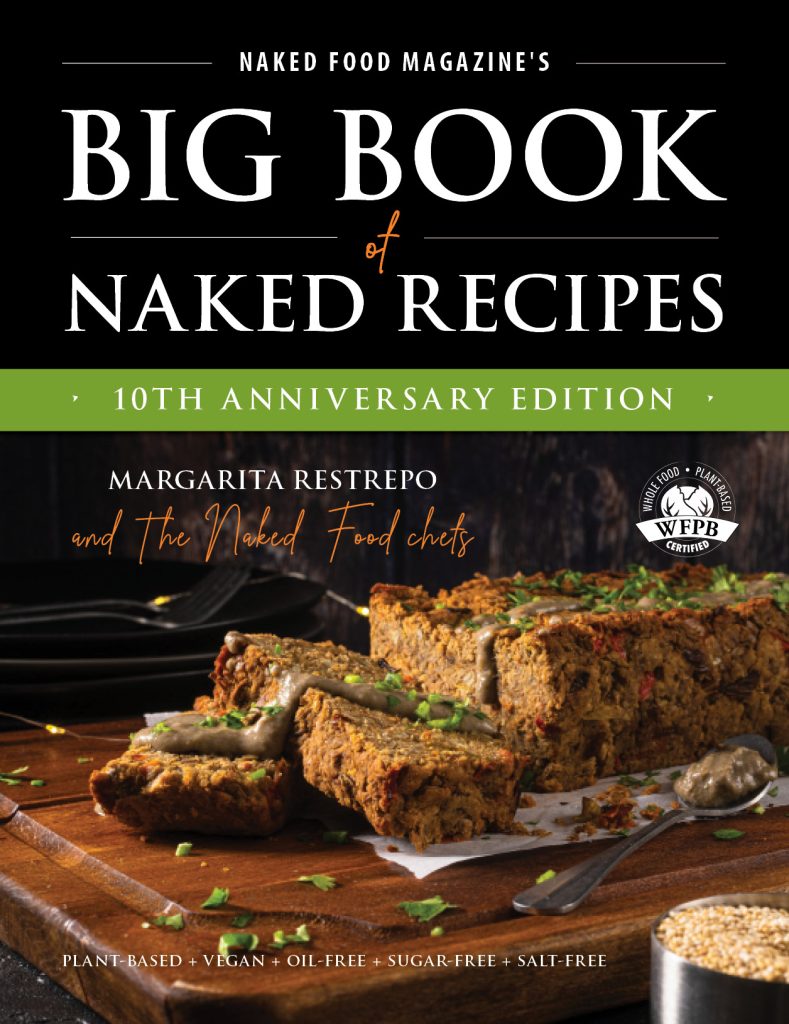Physician and Musician – Is there anything Dr. Barnard can’t do?
Dr. Neal Barnard is the founder of the Physicians Committee for Responsible Medicine in Washington, DC. For over 30 years, he has been a pioneer in bringing science-based nutrition research to the masses and is credited with improving the lives of people, animals, and the planet, as well as spearheading changes in medical school education. He recently celebrated the one-year anniversary of the Barnard Medical Center where patients learn how to make lifestyle changes that will produce healthy outcomes. Making time in his extremely hectic schedule, Dr. Barnard sat down with Naked Food Magazine’s lifestyle editor, Robin D. Everson, for an interview on his latest project: the creation of CarbonWorks, his new rock band.
You have been in numerous bands over your musical career – including Pop Maru and Verdun (as well as during your teen years) – what makes CarbonWorks (CW) different from other bands?
The overall theme of this new album might be called “tearing down walls”—between musical genres, between languages and cultures, and, as you’ll see in the lyrics—between humans and all the other species. So the album is a bit of a linguistic adventure and also adds quite a mix of musical genres to the foundation of rock. The lyrics tend to come back to tenderness and compassion, albeit somewhat obliquely. That wasn’t done self-consciously; it’s just where the music needed to go.
The other unusual thing is that are 16 musicians on the CD, which is a bit unusual. Each one brought his or her own musical sensibility to the project. They are great at what they do and really fun to work with.
How did you go about forming CW?
Each musical project starts with writing music that I wish existed but doesn’t yet. Once the music is written, you find people who can actually play it. So this band includes some terrific rock musicians with whom I’ve worked in the past, some great classical string players, and two unbelievably talented Vietnamese musicians. Then Naif Hérin came in because basically there is no one in the world who sings like she does. I would say the same about Chris Thomas King on the guitar; he is extremely distinctive. I just asked everyone to be part of it, and it was a wonderful experience.
Where did you get the name CW? What is its significance to you?
Well, “the Beatles” was already taken! Seriously, to take a rather unromantic view of things, at the bottom of it all we are carbon, and these are our works.
Neal, you have a distinct sound not heard in other indie rock bands, how would you define CW?
Music is like a recipe. The final result depends on what went into it. So, in this case, we used a pretty good dose of rock, because that’s where the pulse comes from. And we added classical instruments—violin, viola, cello, and double bass—because they add beauty and restraint. And there was a measure of jazz, blues, and Vietnamese music, too. We blended it all together, and this is what popped out. The goal was not to experiment but to create something beautiful or at least striking, and the diverse elements are spices that have to work together.
One other thing: Music is often an acquired taste, so sometimes it takes a few exposures for a new song to make musical sense.
You are a physician by day, musician by night. What percentage of your brain contains song lyrics?
That’s a cute question! Actually, I have so many other people’s lyrics stuck in my head that I wish I could get rid of. Seriously, how many neurons have I inadvertently devoted to memorizing “you are the wind beneath my wings” or “learning to love yourself is the greatest love of all”—which is a sentiment I don’t even agree with!?
You are coming off of a 10+ year hiatus. What made you decide to return?
You start planting again fairly soon after the harvest. Which is to say, the new project started right after I released Verdun in 2004. But it took a while before I had a collection that deserved to be released. I threw away quite a lot of material that didn’t make the cut.
But, to state the obvious, we’ve been busy with other things. Since 2004, we’ve knocked out the meat group from federal diet guidelines, ended experiments on chimpanzees, stopped the use of animals in medical school education, reformed toxicity testing, created the online Kickstart and Food for Life programs, conducted several major clinical trials including our NIH-funded study on diet and diabetes and two more with GEICO, published 54 scientific articles and 7 books, filmed 4 PBS shows, created a new medical center, and lots of other things. Music gets the time that remains when those things are in the oven.
Some of your songs include Vietnamese instruments as well as Asian themes. What made you decide to incorporate these elements into your repertoire?
When I was in medical school at the George Washington University, I lived in a part of town where there were many Vietnamese shops, and I fell in love with the music. As it happens, the pentatonic scale used in traditional Vietnamese music is the same scale used in blues. So it fits in surprisingly well. Also, I suspect that the war that killed so many during my formative years had worked its way into my subconscious. When things are both beautiful and tragic at the same time—as Vietnam has been—they are hard to forget.
World-renowned performers Naif Hérin and Chris Thomas King are members of CW. Tell us what they bring to the group.
One day I heard Naif singing on a Belgian radio station, and I was so impressed with her voice and her writing. And shortly after that, I was working on “Winged Victory,” which is the finale of “The End of the World” suite and is very challenging to sing. So I asked Naif to sing it, which she did perfectly. Then we decided to translate “Song for an Angel” into Italian, and that was a complete knockout, too.
Chris Thomas King, to my ears, is a brilliant musician and is also the heir to the blues guitar tradition that runs from Freddie King and Albert King to B.B. King. I had recorded the basic tracks for “The Beginning of the End,” but I still needed to record the lead guitar part which is a challenging solo in 7/4 time over a landscape of power chords and a string quartet all playing simultaneously. I was getting ready to do it myself, but then I heard Chris at Blues Alley in Washington, and I realized that he was the man. And he was spot-on magical.
Some of the proceeds from the sale of the album go to the Physicians Committee for Responsible Medicine. Tell us about the organization that you founded.
I set up the Physicians Committee to bring physicians’ voices to the movements for prevention, healthier diets, and alternatives to animal research. The idea was that they could lend expertise and credibility, and so far it’s worked out well. We are always finding new ways to reach people, through science, litigation, social media, books, humor, and now music.
This interview is available in the Spring 2017 issue of Naked Food magazine. The CarbonWorks CD is available at www.amazon.com. The music videos are available for viewing on YouTube.com.

























